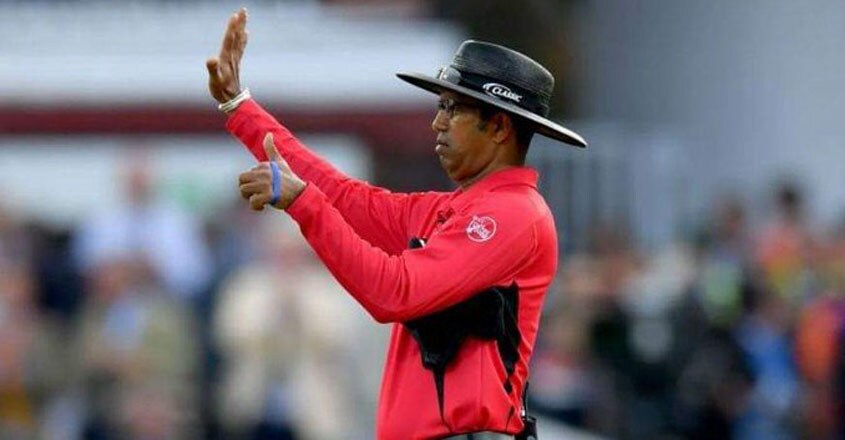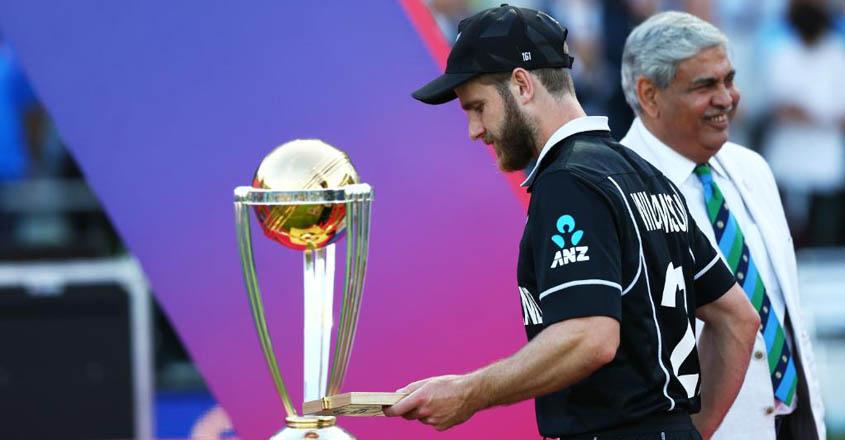Umpiring continues to be a thankless job

Mail This Article
It's an old idiom in cricket that umpires come to the attention of public only when they make a bad decision. Umpires are expected to be perfect and keep on making the correct decisions, irrespective of the players involved, the match and ground conditions or the stage of the game. A series of good decisions rarely win an umpire any appreciation from the public but one wrong response to an appeal would be sufficient for him to be made as the villain of the piece for spoiling the fortunes of one of the sides.
The recent ICC World Cup final offers a classic example in this regard. It was a match that went down to the wire with two ties, one at the close of allotted 50 overs for each side and the next one after the Super Over. The last 10 overs of the match offered edge-of-the-seat excitement as fortunes swung wildly, favouring both sides in almost equal measure, following some irrational algorithm. It must have been extremely stressful for the two on-field umpires Kumar Dharmasena and Marais Erasmus, their actions under scrutiny of thousands of fans watching the game on television besides the presence of nearly 30,000 spectators at Lord's, who were shouting their heads off while soaking in the drama unfolding on the field.
It is not in dispute that Dharmasena committed a mistake in awarding six runs when the throw by Martin Guptill ricocheted off the bat of a diving Ben Stokes to the boundary. The laws of cricket state that in case of runs obtained through overthrows or deliberate acts on the part of fielders, the run in progress shall count provided the batsmen have crossed at the instant of the act or throw. Television replays showed that batsmen had not crossed for the second run when Guptill threw the ball and hence only five runs should have been awarded. It would have been humanly impossible for Dharmasena to see with absolute precision where the two batsmen were located at the instant of throw, given the number of activities that an umpire is required to monitor while play is in progress. The two umpires consulted and decided that batsmen had crossed when throw was made. Had they consulted the third umpire, this error could have been avoided as replays showed clearly that throw took place prior to crossing by batsmen. This lapse on the part of umpires predictably attracted widespread criticism from the commentators and public.
It was clarified by Dharmasena and later by the International Cricket Council (ICC) that such consultation could not be carried out as there was no provision in the laws of cricket for the same. This was a ridiculous explanation as it is well known that laws and regulations would not be able to anticipate and cover all situations, which is the reason why there exists a residual clause in all statutes giving discretion to the concerned authorities to act according to the needs of the hour, based on the principles enunciated therein. The fact that there was no specific mention about the situation regarding overthrows should not have prevented umpires from taking the assistance of third umpire who could have offered correct advice after seeing the replays. One hopes the ICC would take care to avoid such instances in future and provide best possible support to the on-field umpires using available technology. Taking the help of third umpires to detect overstepping by the bowlers is one such move in the correct direction and would be welcomed by players, officials and spectators alike.

The recently concluded first Ashes Test between England and Australia was in the news for the brilliant comeback by Steve Smith, who scored centuries in both inning to set up a famous win for his side. However, this game also gained infamy for the extraordinarily large number of referrals made by players for seeking assistance of Decision Review System (DRS). Altogether there were 20 referrals out of which 10 were upheld, which would straightaway confirm that on-field umpires Joel Wilson and Aleem Dar had a poor match. Fifteen decisions of Wilson were reviewed, out of which eight were found to be wrong and warranted reversal, while Dar’s performance was marginally better. Commentators, all of them former players, had a field day, lashing out at what they perceived was a pathetic show on the part of the officials.
Outrageous call
While outlandish statements from former players from within the confines of the commentary box have become the norm, what surprised one was the demand made by Ricky Ponting that the concept of neutral umpires be reviewed by the ICC. Concealed in this claim is the message that umpires from England and Australia are better than those from other countries and the players should not be denied the service of such “superior officials” on account of ICC’s neutrality policy. There have been good, bad and indifferent umpires from all parts of the world and Aussies and Englishmen are no exception. Hence the attempt on the part of these “experts” to assign a superiority to umpires from their countries, that they do not possess, is not merely outrageous but laughable as well.
Umpires have responded to this weird suggestion by stating that they would like the present system of neutral officials to continue. They feel that it is better to be judged as incompetent or error prone rather than being tagged as biased. In matches that evoke huge emotions such as India-Pakistan games or Ashes series, the umpires are under more pressure than even the players, which would make them more susceptible to make errors. If such matches are handled by local umpires, then the allegations of bias would most certainly rear its head, every time an umpire commits a mistake that favours the home side. This would be detrimental to the morale of umpires themselves besides causing damage to the spirit with which the game is played.
Sensible response
What offers some solace to the followers of the game in this scenario is the approach of players as voiced by the captains of the sides that played these games. Kane Williamson, the skipper of New Zealand side, who was at the receiving end of the decision of umpires to award six runs for the overthrow in the final over of World Cup final, downplayed the impact of the incident saying that such ball-by-ball analysis would not help anyone. In addition to being an example for the concept of sportsmanship that should govern the conduct of players, this also demonstrated a level of tact and maturity that is rarely seen presently in international sports arena.
Similarly, Joe Root, the captain of England side that lost the Test to Australia, defended the umpires stating that officials are as much susceptible to committing mistakes as players. He pointed out that while it was easy to criticise, the fact remained that umpires too faced similar pressure as the players. The message sought to be conveyed by Root was that players have learnt to take the errors committed by umpires in their stride as they knew that such things are part and parcel of the game.

Cricket at international level has evolved during the last three decades as a spectator sport which attracts huge revenue from audience watching television in the comforts of their homes in addition to amounts paid by the spectators who see the action from within the stadium. The ICC has taken measures to enlist the help of images caught by television cameras placed all around the playing arena to assist the officials in their decision making. These measures have helped to ease the pressure on officials to some extent and to improve the quality of umpiring.
What could be the way forward? As stated earlier the measure by the ICC to use the services of the third umpire for detecting overstepping by bowlers would help his colleague at the bowler's end who can now focus solely on the batsman, when the ball is being delivered. Similarly a thought could be lent to the suggestion that review system should be used solely at the request of umpires, as it happens in football. If the field umpires feel that they require the assistance of third umpire, they would be free to do so at any time during the duration of the match. Similarly, if the third umpire sees that field umpires are committing a mistake, he should be able to intervene and inform them and rectify it. The present system of players seeking review and keeping restrictions on the number of such requests do not provide the type of perfection that is sought for from electronic aids.
All the stakeholders involved in the conduct of the game - administrators, officials, players, observers and the spectators - should realise making systematic improvements in the conduct of the game is a long drawn process, which would need improvisations and innovations along the way. Consolidating the gains achieved while seeking to keep improving while moving forward is the mantra followed by organisations that have embarked on this path and emerged successful. The ICC has the mandate of followers of the game to take the game to the next level and they should leave no stone unturned in their efforts to attain perfection in all aspects of the game.
(The author is a former international umpire and a senior bureaucrat)


